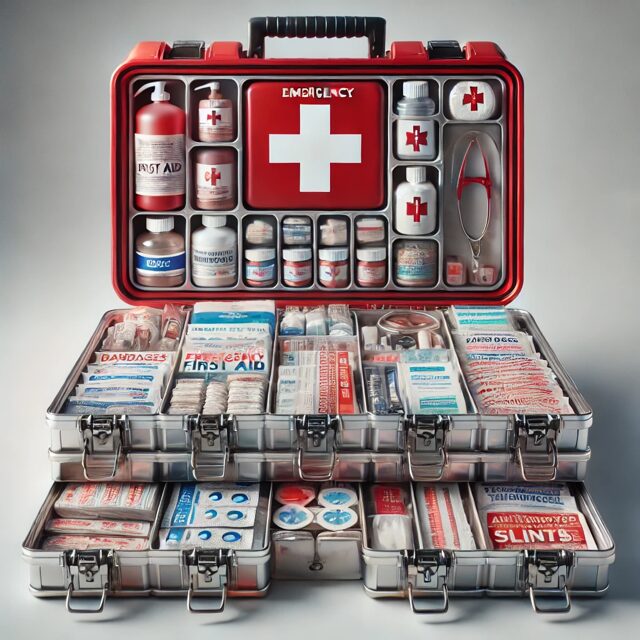This kit is designed to last two weeks and includes essential supplies, prescription medications, and considerations for special needs.
1. Basic First Aid Supplies
- Bandages and Wound Care
- Adhesive bandages (assorted sizes): 50
- Gauze pads (3×3 inches): 20-25
- Roller gauze bandages: 2-3 rolls
- Adhesive medical tape (waterproof): 2 rolls
- Nonstick sterile bandages: 10
- Antiseptic wipes: 40 pieces
- Antibacterial ointment (e.g., Neosporin): 2 tubes
- Burn ointment: 1 tube
- Hydrogen peroxide or iodine solution: 1 bottle of each
- Tools and Accessories
- Scissors (blunt-tip, medical-grade): 1 pair
- Tweezers: 1 pair
- Safety pins (assorted sizes): 1 pack
- Sterile cotton balls or swabs: 50
- Duct tape (multi-purpose): 1 roll
- Emergency Cooling and Protection
- Instant cold packs: 4
- Mylar thermal blankets: 4
- Miscellaneous Supplies
- First aid manual: 1
- Emergency whistle: 1
2. Advanced Medical Supplies
- Tourniquet: 1
- CPR mask with one-way valve: 1-2
- Splints (finger and arm): 1 small, 1 medium
- Sterile syringe kits (for wound irrigation): 1-2 kits
- Suture kit or butterfly closures: 10 closures
3. Prescription and Over-the-Counter Medications
General Medications
- Pain relievers (e.g., acetaminophen, ibuprofen): 1-2 bottles of each
- Antihistamines (e.g., diphenhydramine, loratadine): 1 bottle
- Anti-diarrheal medication (e.g., loperamide): 12-24 tablets
- Antacids (e.g., calcium carbonate): 1 bottle
- Oral rehydration salts (ORS): 4-6 packs
- Cold/flu medication (e.g., decongestants, cough suppressants): 1-2 packs
- Hydrocortisone cream: 1 tube
- Calamine lotion: 1 bottle
- Antibiotics and Antivirals (Consult a doctor for prescriptions)
- Amoxicillin-clavulanate
- Azithromycin
- Ciprofloxacin
- Doxycycline
- Metronidazole
- Oseltamivir (Tamiflu)
- Specialized Prescriptions
- Epinephrine auto-injector (EpiPen) for severe allergies
- Rescue inhaler (e.g., albuterol) for asthma
- Blood pressure medications (e.g., amlodipine)
- Diabetes supplies (e.g., insulin, glucose monitor)
- Muscle relaxants (e.g., cyclobenzaprine)
- Anti-nausea medication (e.g., ondansetron)
4. Emergency Items
- Flashlight or headlamp: 2, with extra batteries
- Solar charger or power bank: 1
- Waterproof matches: 1 pack
- Multi-tool (with scissors, knife): 1
5. Hygiene and Sanitation
- Hand sanitizer: 2 large bottles
- Soap or disinfectant wipes: 40-50 pieces
- Disposable washcloths or wet wipes: 80-100 pieces
- Face masks (disposable surgical masks): 20-30
- Toilet paper: 4 rolls
- Feminine hygiene products: Sufficient for two weeks
- Plastic bags for waste disposal: 20
6. Documentation
- Emergency contact list (doctors, family, hospitals): 1
- Health insurance information: Copies for all family members
- Medical history forms: For each family member
7. Special Needs Considerations
- Pediatric medications (weight-appropriate dosing)
- Prenatal vitamins and formula (if needed)
- Spare parts for mobility aids (e.g., wheelchair components)
- Hearing aid batteries
8. Storage Recommendations
Primary Container:
Durable waterproof plastic container (e.g., Rubbermaid ActionPacker) or heavy-duty duffel bag for easy transport.
Secondary Organization:
Color-coded waterproof pouches for subcategories (e.g., red for medical, blue for hygiene).
Placement:
Store in a cool, dry, accessible location. Keep a smaller portable kit in each vehicle or go-bag .

